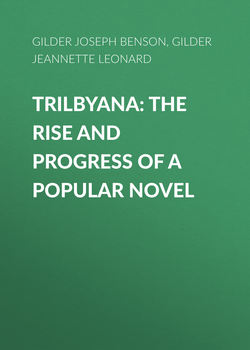Читать книгу Trilbyana: The Rise and Progress of a Popular Novel - Gilder Jeannette Leonard - Страница 1
ОглавлениеIt is many a year since a book has attained the popularity of Mr. du Maurier's second novel, "Trilby" (printed as a serial in Harper's Monthly, from January to August, inclusive, and then issued in book-form, on Saturday, 8 September, 1894). Several others have sold as well – some even better; but neither "Looking Backward" nor "Ben Hur" (to name but these two) has captivated the public in the same manner or in the same degree as this romance, this fairy-tale of the three British artists, the blanchisseuse who posed for "the altogether," the Parisian masters of painting, and the trans-Rhenish masters of music, in the Latin Quarter of the early fifties. It is a story written out of the author's very heart, and it finds its way straight to the hearts of his readers. This is the secret of its unique success. Its charm is emotional rather than intellectual. With all its art, it impresses one as essentially ingenuous. It is a book to be loved, not merely to be liked or admired.
On 16 June, 1894, The Critic printed, with comment, a letter in which Mr. Whistler protested to the editor of an English newspaper against the libellous likeness of himself to be found in the character of Joe Sibley, one of the minor personages in the story of "Trilby." In the fall there were so many sporadic calls for this number of the paper as soon to exhaust the supply carried over from the summer. There seemed to be a general desire on the part of our readers to bind up the Whistler letters, etc., with the text and pictures of "Trilby" as printed in Harper's Monthly, the American artist's protest having led to a slight revision of the story before its appearance in book-form. The hint was acted upon; and two pages of "Trilbyana" were printed in The Critic of Nov. 17.
Though an extra edition was struck off, the call for this number has at last exhausted the supply; and the present pamphlet, containing among its many items of interest a majority of those that have found a place in the columns of The Critic, may fairly claim to be issued in response to a popular call.
J.B. & J.L. Gilder.
